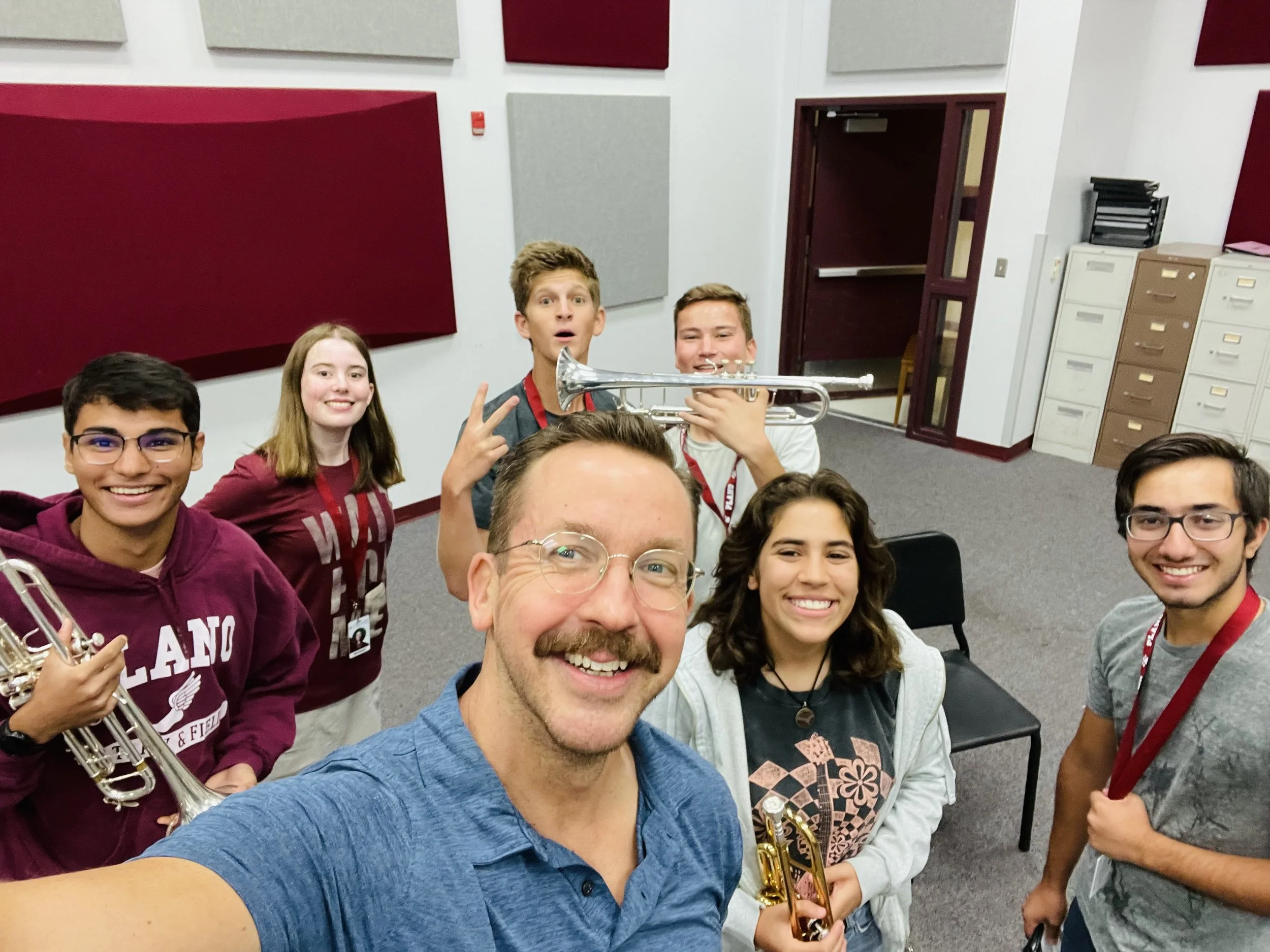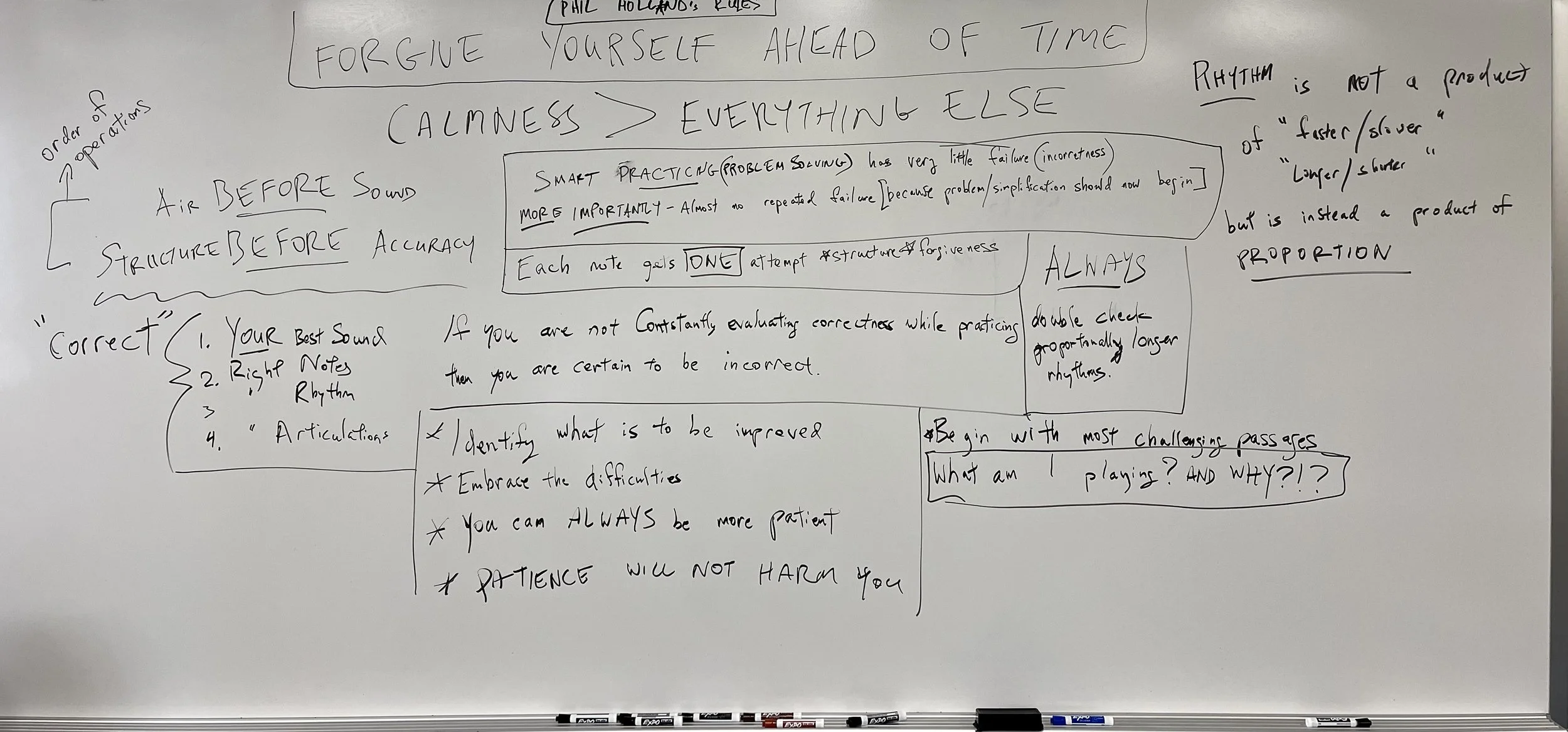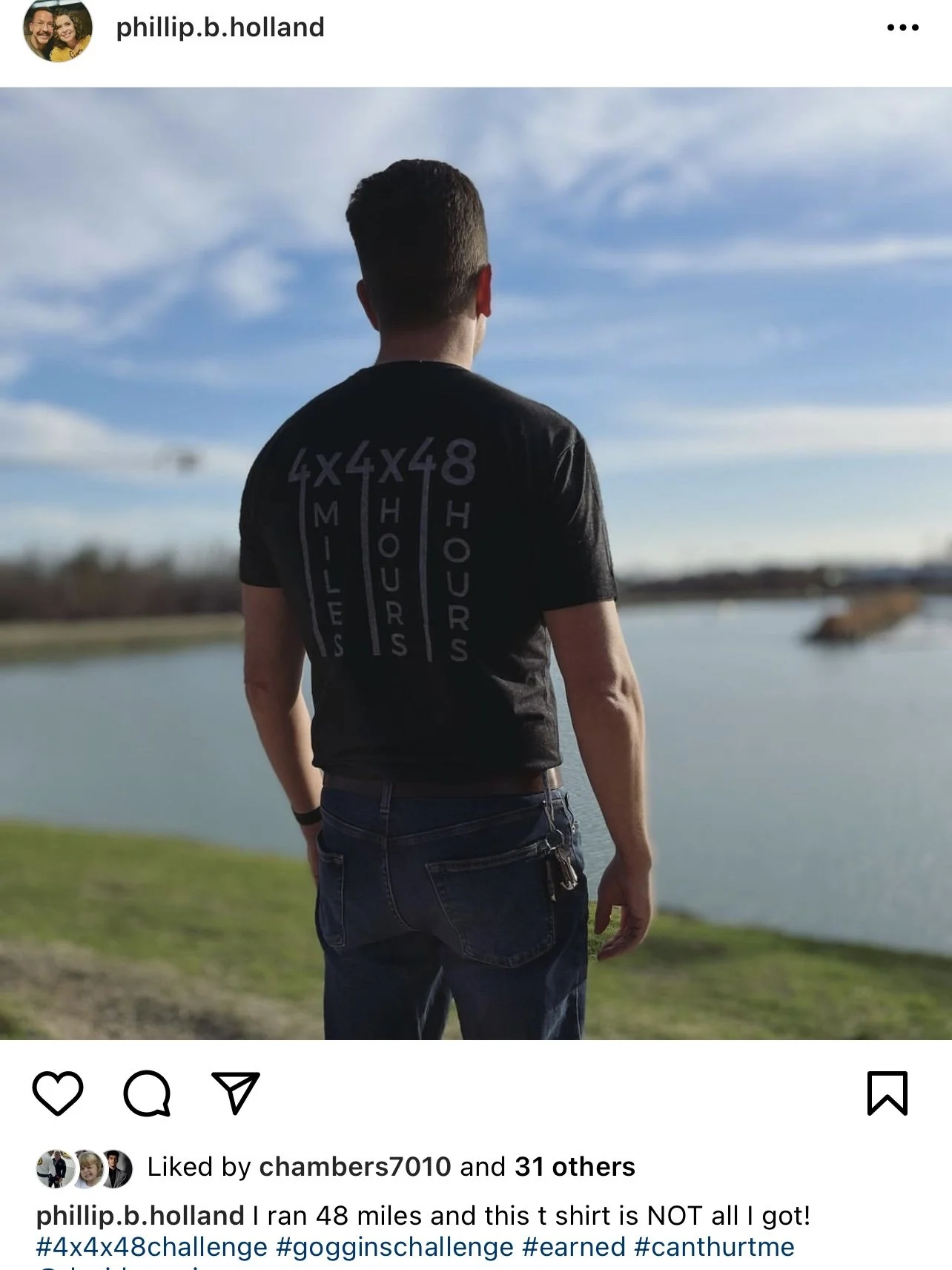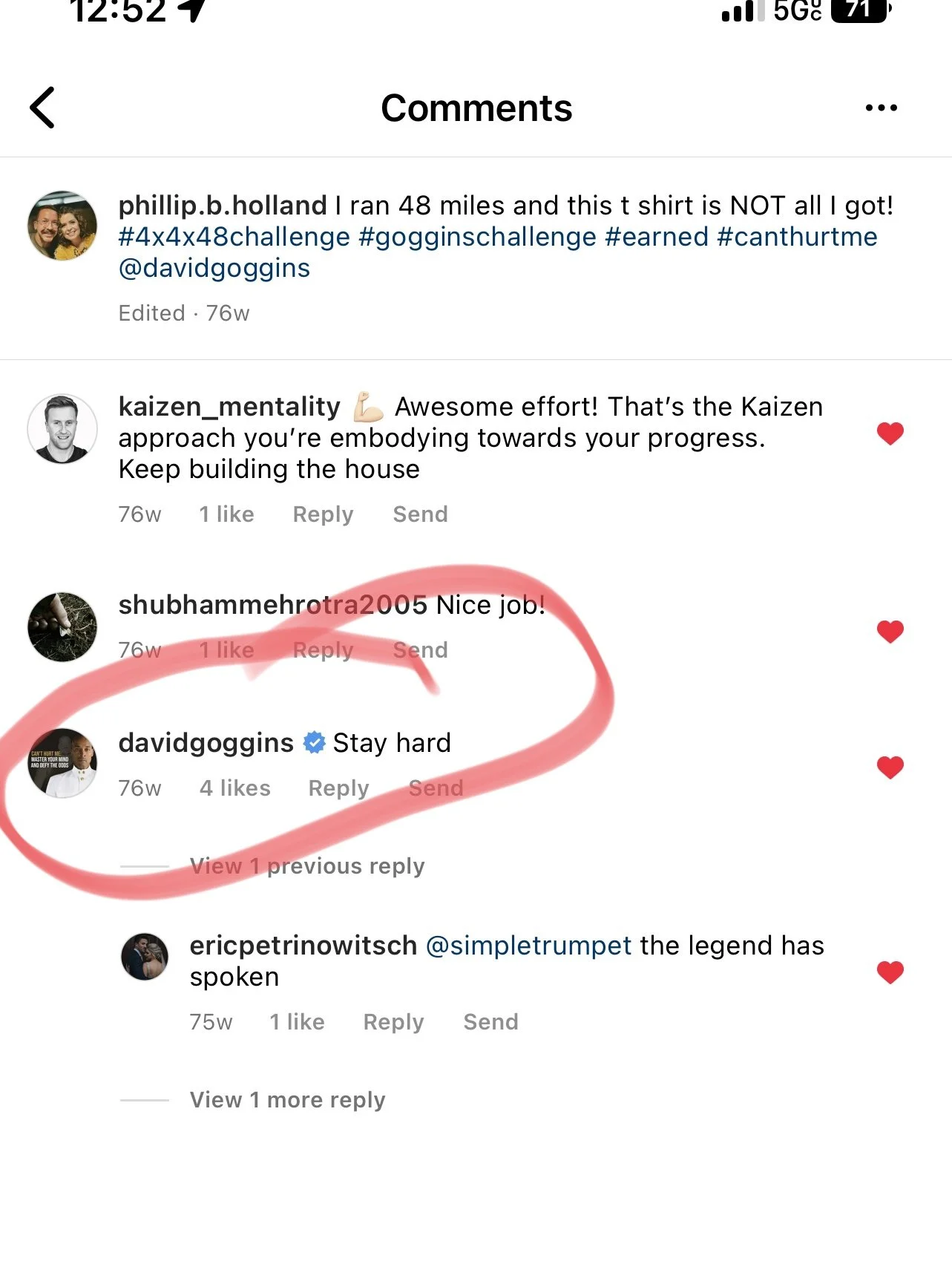Who Is Phil Holland?
As a high school student I was the first chair All-State trumpet player in 10th, 11th and 12th grade for Tennessee. When I has a Junior in high school, I participated in the John Philip Sousa National Honor Band. It was a band composed of all state players from all 50 states. I was first chair. My senior year I auditioned for and won lead trumpet in the McDonald's All American High School Jazz Band. It was so cool because it was also sponsored by the National Academy of Recording Arts and Sciences. As a member of the band I was a Grammy Nominee's for "Outstanding High School Musician of the Year". We all spent a couple of weeks in New York and attended the Grammys. What a kick!
As my senior year wrapped up I auditioned for and was accepted into the Eastman School of Music in Rochester, New York. I couldn't have been more excited to attend my mom's alma mater from over thirty years earlier. At Eastman I studied with Charlie Geyer and forged what would turn out be many of my most important life long friendships. Eastman is an amazing place but I and all of my friends will tell you 1992-1996 were the best!
After Eastman I won a position playing Co-Principal trumpet in the United States Air Force Heritage of America Band and Brass Quintet. I served in the USAF for four years and then was appointed to a one year position as Associate Principal in the Virginia Symphony Orchestra. In 2001 I took a leap of faith on the strength of my friendship with Jeremy Kondrat, the band director at Plano Senior High School and friend from Eastman I moved to Plano, Texas to teach and freelance which I continue to do.
I tell people constantly that I am the luckiest type of teacher. From my time beginning with a student just after fifth grade I often have SEVEN years to work with my kids. Time is the most powerful of teachers and it is on my side. I didn't invent the trumpet and certainly am not reinventing the wheel with my teaching. My students humble me with their obedience and dedication. What they continue to accomplish amazes me.
I have had many students in the Texas All-State band placing as high as 1st in the state. At least 5 GDYO principals have been Phil Holland students. My high school students have attended Tanglewood Institute and Idyllwild Arts Academy summer program and placed as high as the finals in the National Trumpet Competition. Beyond high school my students have been accepted as trumpet players into Juilliard, Manhattan School of Music, USC, Baylor, University of Miami, New England Conservatory, Peabody, Arizona State, UT, and others.
Listen!
I am playing principal trumpet on this GREAT recording of Fanfare For The Common Man.
Phil’s Rules (Not Just For Trumpet)
Thoughts On Ease and Beauty
My Students Know Me Best - Read What They Say
I took lessons from Phil Holland for six years, but only some of them involved the trumpet. In the year since our final one, I’ve headed down a path that has almost nothing to do with music. And while the “fullness of my tone” and my “indistinct articulation” haven’t really transferred over into my life outside of band, Phil’s wisdom (he’s a young guy, I know, but I look up to him like that) certainly has.
There’s a mentality running beneath his approach, the kind of thing that gets stuck in your head even when you pack your instrument away for the last time. The way I look at it, it’s about moments. It’s about preparing the right way, with the right mindset, for the right amount of time, and then pouncing on very clear moments with the control and confidence afforded to you by that preparation. Phil’s philosophy has helped me conquer nerves and stage fright, it has shaped the way I approach complex problems, and, most importantly, it has transformed my definition of “success.” Those ideas extend far beyond a three-valve metal tube.
I walked in to my first lesson during the first week of seventh grade, and I sat down while he introduced himself. I remember being more than a little nervous and he being more than a little aware of it. He made no assumptions; I had already been playing for one year, but we started with mouthpiece buzzing. This was square one, the first limestone block in the foundation. So we began like beginners should, and over the course of the next year, my trumpet playing improved dramatically.
I could continue on and explain how I started to find success in my band placement auditions, and in my chair tests, and in all those other things that matter so much less now than they seemed to back in the day. But I’d rather not, because the most important thing that I learned from Phil in that first year had absolutely nothing to do with the trumpet.
Phil understands why middle school and high school are difficult. He was very in-tune to the fact that sometimes I couldn’t have cared less about how a phrase should’ve been inflected, because I was tackling bigger problems behind the scenes. Underneath my little bright-eyed face and my smile filled with braces, I was in turmoil. I saw my parents’ marriage collapsing, and I felt lost, and I couldn’t control myself at all. In more than half of my lessons I broke down crying. My expectations were too high, maybe. I was afraid of disappointment, perhaps. All of these things might have been contributing factors, but it really boiled down to having a lack of solid ground on which to stand. My weekly trumpet lesson, which started to look more and more like a counseling session, became that anchor for me.
Phil did more than just teach me that first year. He listened to me. I realize now that I probably threw him into some situations where it was almost impossible to find the right words, but I feel like he always did. I slowly gained composure, and I mellowed considerably. And then, as these things tend to go, everything started to work itself out.
Fast forward to my senior year of high school. I find myself seated in a black chair in the front of a room at Allen High School. I’m about to take a no-nonsense breath before I begin my final run of the last etude of my last All-Region audition. In 45 seconds, the source of all the stress in my life will be gone. Realizing that a few costly mistakes earlier in the day would probably ensure my failure to qualify, I want nothing more than to end with a bang and bid an appropriate farewell to a ridiculous competition. So I begin. I move from silence into sound with a hopeful tenacity. As my eyes scan the page, the lines of little notes move like a teleprompter in my mind. And I just keep hearing Phil’s advice over and over again: “breathe like you mean it,” “don’t dwell on mistakes,” “be peaceful instead of frantic.”
If you haven’t already figured it out, I’m an insanely sentimental person. But of all the memorable, emotional, cinematic experiences in my 19-year life, that 45-second etude still stands out in my mind because of what it felt like. Not how it sounded, which was the basis for the judges’ results. For all I know, it didn’t sound that great, or at least that’s what my ranking at the end of the day suggested. But I left before those rankings were posted, which is something I’m still very proud of. I didn’t need the scores to feel satisfaction of reassurance. For that brief three quarters of a minute, I owned something that the judges were powerless to deprive me of. I had control: over my own breath, over the sound in my horn, over the other nervous kids in the crowd who waited with bated breath and hung on my every note with a scrutinizing ear. So I unhinged, and I let something unconscious take over while my focused mind soaked in all those sensations. I think it was the best thing I ever played.
That is Phil’s mantra through my eyes. As comparisons go, Mr. Miyagi is a pretty good one, or maybe Old Ben Kenobi from that little hut in Tatooine, but they’re both a bit too one-dimensional. Phil is disciplined and irreverent, which seems like a contradiction. He’s got a humble braggadocio (don’t we all?). He’s the consummate trumpet player, with a cocky demeanor and a wall of sound to back it up. He tells it like it is, but he respects people if they’ve earned it (if not, they’ll probably be the subject of a biting limerick or two).
Last year I graduated from Plano Senior High School. As I walked across the stage and grabbed my diploma, I felt a flood of emotion rush over me, but I didn’t cry, I promise. When I walked out of my final lesson with Mr. Holland, I did. No one besides my parents had watched me grow up the way Phil did. No one had helped to make that process of “growing” possible. He will always be a cherished teacher, mentor, and friend.
I’m still hungry the way Phil told me to be. I’m chasing life and art in the kind of way that is paradoxically totally different and exactly the same as we what we used to strive towards in those little soundproof, fluorescent rooms. I’d like to thank Phil for those seven formative years, and encourage anyone who is reading this to run towards hard things instead of away from them.
Logan Crossley
"For the past seven years Phillip Holland has been at the forefront of my musical education. He has dedicated his life to the trumpet and has tried to pass on his experiences and advice to me. Over the years, Mr. Holland has helped me succeed in my competitions and auditions by motivating me to work harder than my peers. This work ethic and dedication has translated over to and influenced the way I work in all other aspects of my life. The advice and wisdom he has given me goes much farther than just music. Every day he teaches me something new about how to live life respectfully and obtain happiness in whatever I choose to do. As far as teachers go, Mr. Holland is definitely incomparable to any other. The way he teaches is unique, goofy, and philosophical, but at the same time he is completely professional and incredibly knowledgeable in what he does. No other teacher has ever had such a significant impact on my life or inspired me to the same extent.”
I wrote this in 2011 as a senior in high school when I nominated Phil as my most inspiring professor. None of what I wrote has changed, but I would like to expand on what I said back then about this incredible guy.
Phil is still, and I suspect will continue to be, the most inspiring and influential professor I have had. The incredible trumpet experience and expertise this guy has to offer, in addition to his unique ability to teach and motivate through values, makes taking lessons with this guy a one-of-a-kind experience.
When I think back on my lessons with him, I don’t think of the exercises or etudes he assigned, or even of the way he made me want to be a better trumpet player. I think of the way he motivated me to be a better person. There’s no doubt that the lessons he teaches made me a better musician, but I believe they did so through teaching me to want to excel and be better in every aspect of my life. Similar to what comes out of the horn being a direct result of the way you practice, Phil taught me that what you get from life is a direct result of the way you choose to live it.
Thanks Phil!
-Andres
I took lessons from Phil for a number of years from middle school through high school, about 8-11 years ago.
Looking back, I believe what had helped me as a young musician at the time and what I take with me today from Phil's lessons is not a set of trumpet-playing "tricks", but a general approach to solving complex, open-ended problems. Now that I've worked with a number of teachers, mentors, and professors in a variety of fields since high school, I think this is really key criterion that separates effective (and memorable) teachers from the usual ones.
In any learning process, a student will go through a number of "ah-ha!" moments - times when the student not only understands a new concept, but is able to understand that he/she understands the concept. That is, the student is able to identify what he/she did that led to the improvement and further capitalize on this progress. As a young musician, the big challenge I faced during at the time was learning to sound good on a trumpet after getting or removing braces. Clearly, no teacher can prescribe set of quick fixes in playing technique to adapt to my particular situation - obviously, everyone has different mouths/jaws, orthodontics procedures, etc. I felt like I had to relearn this instrument each time I underwent a change in orthodontic devices, and this is precisely what Phil helped me do effectively. Following Phil's guidance, I basically learned how to teach myself (e.g. how to practice) to improve my sound on the trumpet.
If I had to, I'd summarize Phil's teaching method briefly as the following: There are always a number of factors that you cannot control (e.g. orthodontics) or are not yet able to control (e.g. things that require strength/conditioning, muscle memory, or mental fluency). The student should seek to exercise, with precision, those factors that are under his/her control and thereby gradually expand this sphere of influence. At first glance, it is completely obvious - you want to focus your time/energy on things you can control when you can control them, and you don't want to waste time/energy stressing about things beyond your influence. In this sense, Phil's teaching method was completely intuitive. However, the fact that most of us have trouble doing this when learning new skills means we often need the guidance of an experienced teacher.
Being led through this process, by itself, would have been sufficient to make Phil one of my most memorable mentors, but it would be near impossible to separate the essence of Phil's lessons from the man himself. He was always humble, supportive, and genuinely excited when he noticed progress in my playing. As a student, it's not always clear at the moment exactly how/why a particular lesson or exercise is going to help you improve, but Phil's down-to-Earth attitude and refreshing honesty made it easy to trust him that he was here to help.
Thanks, Mr. Holland, for the opportunity to study under you. I know everything I've written here is based on events from about a decade ago, that is, a decade earlier in your teaching career. I can only assume you have somehow further perfected your teaching style and methods over this time. Clearly, you are taking your teaching career to new heights and continuing to re-invent yourself. I wish you good luck!
-Kerry
Read My Linked Essays On Resilience
I Lost 50 Pounds and Made a Better Man
How To Survive Divorce And Make A Better Man
Body And Mind - Do Hard Things
Fanboy Moment…
I ran the Goggins 4x4x48 challenge.
It hurt.
I found answers to questions.
I loved it.
Through my social media I raised $2,200 for Special Operations Warrior Foundation.




